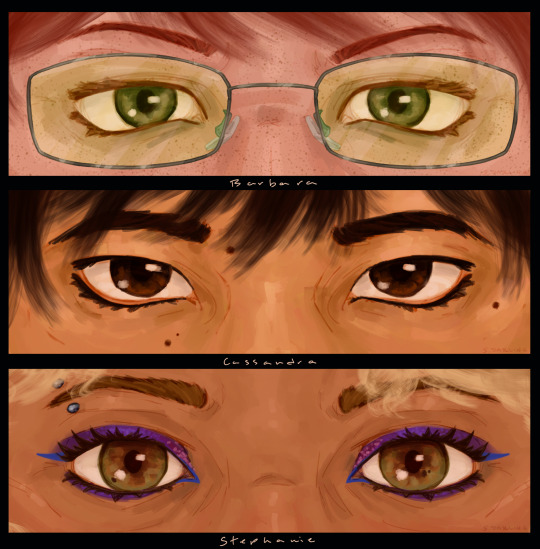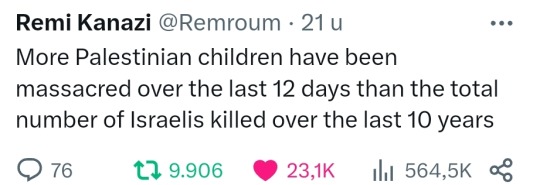#Semantics
Explore tagged Tumblr posts
Text
Ya know, I really dislike when they people will refer to victims of a conflict as Martyrs. I've heard it about Palestine and Iran most recently, in the sense that these people were "martyred" by Israel or the US. Yet to be Martyred is to volunteer. It is to go willingly to your death because you believe in the cause you are dying for, that you would rather die than give up on those principles.
The people of Iran and Gaza did not volunteer. They did not die for their beliefs. They were murdered in cold blood.
#I've been hearing this for years in left wing circles#and it always bothers me because the rhetoric sounds to my like its in a roundabout way justifying civilian casualties#by implying they die not out of the callous bloodlust of the aggressor but because they were standing up for their ideals#semantics#politcs
1 note
·
View note
Text
There's something oddly familiar about this post, but for the life of me I can't put my finger on what.

13K notes
·
View notes
Text
"Bigger" is stronger than "biggest." There is absolutely nothing you can say to change my mind.
If I say "biggest x vs bigger x" logically this is a contradiction. If I say "bigger x vs bigger x" this is also a contradiction. If I say "bigger x vs big x", "bigger x" is bigger. "Bigger" is always either bigger or leads to a contradiction. If is say "biggest x vs biggest x", they are equal. If I say "biggest x vs bigger x", it leads to a paradox. If I say, "biggest x vs big x", they are either equal or "biggest x" is bigger. "Biggest" is therefore either bigger, equal, or leads to a paradox. If you compare each case individually, you will realize that "bigger" is either equally strong or stronger than "biggest" in every case.
Another way of looking at it is by considering what each statement excludes: "Biggest" only excludes the possibility that something is bigger than it. "Bigger" excludes both the possibility that something is bigger than it as well as the possibility that something is equal to it.
Ergo "bigger" carries more semantic strength than "biggest."
3 notes
·
View notes
Text
I love it when a news article about rats is clearly talking about trained rats of some description, but the headline doesn't specify that. "Rats are disarming bombs" what, of their own initiative?
6K notes
·
View notes
Text

The Batgirls
Alt under cut

#my Gotham girls#tho only Steph is FROM Gotham#semantics#barbara gordon#cassandra cain#stephanie brown#batgirl#batgirl comics#dc comics#batman comics#ambrose art
930 notes
·
View notes
Text
the three linguistics papers to read about singular they (morphosyntax)
Bjorkman, B. M. (2017). Singular they and the syntactic representation of gender in English. Glossa: a journal of general linguistics, 2(1). Open access link
Konnelly, L., & Cowper, E. (2020). Gender diversity and morphosyntax: An account of singular they. Glossa: a journal of general linguistics, 5(1). open access link
Conrod, K. (2022). Abolishing gender on D. Canadian Journal of Linguistics/Revue canadienne de linguistique, 67(3), 216-241. Open access link
in chronological order because these papers are all basically responding to each other; this papers focus on the (morpho)syntax and semantics of english singular 'they' referring to specific people (like they/them pronoun-users).
if you like posts like this, let me know! i'll give "three linguistics papers to read about (topic)" every once in a while based on interest
1K notes
·
View notes
Text

Who is this DIVA ❤️
#I’d like to think that isn’t lipstick#but the blood of her most recent victim#idk how it got into stick form but hey#semantics#art#fanart#black butler#kuroshitsuji#grell sutcliff#doodle
207 notes
·
View notes
Text

Table with the partinioning of the TREE-WOOD-FOREST semantic domain.
Georgakopoulos, Thanasis & Stéphane Polis. 2018. The semantic map model: State of the art and future avenues for linguistic research. Language and Linguistics Compass 12(2). e12270. https://doi.org/10.1111/lnc3.12270.
#table#semantics#Thanasis Georgakopoulos#Stéphane Polis#2018#Language and Linguistics Compass#semantic maps#typology#lingblr#linguistics
412 notes
·
View notes
Note
it's fascinating to me how endlessly complicated High Valyrian seems to be when you answer questions about it. Is there any language in the world more or less at the same level of complexity?
It depends how you're thinking of complexity. All the languages of the world are equally complex. They have to be, because they all need to perform the same function, and they're all used by the same human brains living inside the same humans living human lives. I think English speakers (and hypothesize that, by extension, the same would be true of Chinese speakers, Hawaiian speakers, Vietnamese speakers, Swedish speakers) look at certain other languages and think of them as more complex in the meta sense because they are more morphologically complex.
By this, I mean in English, for a noun you need to know its singular and plural form—that's it. For a verb, you need to know its -s form, its -ed form, its -ing form, and, very rarely, its -en form. There is some irregularity in form for almost all of these (-ing appears to always be regular), but there aren't more forms, outside of "to be", which has a unique first person singular form.
And...that's it, really. We have adjectival comparison, I guess, but even that can be traded out for an expression (aside from "better" which can't be replaced easily by "more good", most comparatives can be replaced—e.g. you can say something is "more red" than something else even though you can also say it's "redder" than something else). There aren't many word form changes in English a user has to learn in order to be able to use those words in a sentence. The same is true of those languages I listed in the parenthetical phrase above.
Compare that to Spanish, where there are more word form changes for verbs in the present tense (indicative and subjunctive) than in the entirety of English. And that's just one tense for verbs! There's loads more that needs to be memorized; many more word form changes you need to know to be able to use words effectively in a sentence. And there are irregularities on top of that!
Is it the case, therefore, that Spanish is more complex than English?
Certainly, Spanish is more morphologically complex, but does that mean you can express more in Spanish than you can in English? Certainly not! So then what does it mean when we say Spanish is more morphologically complex than English? What's the upshot? What does it mean for the language user?
Perhaps it would help if we compare some Spanish verbs and their English translations:
hablabas "you were talking"
hablé "I spoke"
hable "you would speak"
The precise translation of these verbs will depend on context, but this is a fine example. These are all single words of Spanish. They're different forms that must be memorized, but they're single words. The English requires at least two words for each concept.
So which is more complex? On the one hand, you have fewer words but more forms. On the other, more words, and more words = bigger.
And that, essentially, is the crux of it.
Any time you have complexity baked into single words morphologically in one language, you'll find complexity in the form of multiword expressions in a less morphologically complex language. The meanings are always there(*), but they're expressed in different ways.
As English speakers, we're used to having to express things in multiword expressions, and a speaker of a given language will find their own language to be simple just because. We extend that to think of languages like ours as simpler than those that are different. But, in truth, it's six of one, half dozen of another. Furthermore, there's just as much complexity in languages with less morphological complexity. Consider the following expressions in American English:
I walked to the store. ✅
I walked to a store. ✅
I walked to store. ❌
That's pretty standard. English has articles and you need to use them, right?
I ate the dinner. ✅
I ate a dinner. ✅
I ate dinner. ✅
All those are okay. They don't mean the same thing—and, indeed, the first two have much more restricted contexts—but they're all okay. That's a little weird, isn't it?
Not as weird as this:
I made it by the hand. ❌
I made it by a hand. ❌
I made it by hand. ✅
The first two aren't just weird: they're yikes-a-doodle-do wrong. You might try to brush it aside and say that it's just an expression, and, sure, it is, but ask yourself this: how'd that expression come about in the first place? This one is actually from Shakespeare (Romeo and Juliet) and still works the same way in American English:
You kiss by the book. ✅
You kiss by a book. ❌
You kiss by book. ❌
And just for funsies:
He won by the nose. ❌
He won by a nose. ✅
He won by nose. ❌
You might think the way these shake has to do with what they stand for—that the semantics of the noun in question condition whether or not you can use articles—but consider the first one "store" and compare it to this one:
I walked to the Barnes & Noble. ✅
I walked to a Barnes & Noble. ✅
I walked to Barnes & Noble. ✅
Barnes & Noble is a store, but refer to it by title, and suddenly it's all okay.
Now, if your native language is English, ask yourself: when and how did you learn all of this? Did someone sit you down and tell you where to use which articles and where not to? I'm sure there was some level of instruction you got in elementary school (whether it was accurate or not), but how much of a difference do you think that made? Did you just not use articles before then? And even now, could you explain this? Do you even think about it? Or do you just do it—flawlelssly and effortlessly? Adult learners of English will tell you learning this stuff is a nightmare. Throw in phrasal verbs (pick up vs. pick out vs. pick on vs. pick up on vs. plain old pick) and suddenly English doesn't look too simple anymore.
Bringing this back to your question, when you look at High Valyrian, is there a natural language with an equal amount of morphological complexity? Sure. Maybe something like Latin. But understand that any language will be as complex—not more, not less: as. The only difference with High Valyrian, actually, is its vocabulary isn't as large (give me a couple decades), and it doesn't have nearly as many users as any natural languages. It's also being kept artificially small, in that the language is built up to fit a fictional reality, rather than being expanded to handle anything, the way modern languages are. But pick up any language and it will be equally complex.
(*) From above, it is not always the case that the same "meanings" will be in the equivalent translation of a given sentence. A good example is gender. If you say El río es largo in Spanish it means "The river is long" in English. Like, exactly that. There is no question that these two phrases are functionally equivalent. HOWEVER there is more information in the Spanish sentence. The words el, río and largo are all masculine gender. What does that mean? Nothing more than that they're not feminine. If you hear el in Spanish there are a limited number of words that can legally follow it. When you hear largo, you know that what it refers to has to be in the same class. The function of this is simply to enrich the signal. If you only hear "is large" in English from the previous sentence, you have no idea what noun is large. If you hear es largo in Spanish, you also don't know—but whatever that thing is, you know it has to be masculine. That means that if a Spanish speaker has to guess what es largo they were trivially have a better shot at guessing correctly than an English speaker guessing what "is large" (e.g. if an English speaker has a one in a million shot, a Spanish speaker has a one in 500,000 shot, because roughly half the nouns of Spanish are masculine and half feminine). This means, technically, there's more information in the Spanish sentence than the English sentence, and that information is not represented at all in the English sentence, and is, essentially, unrecoverable. But that "information" is more morphological in nature than semantic.
335 notes
·
View notes
Text
So as a semantics enjoyer some of yall really did not listen when they said it’s “A” Minecraft movie not “THE” Minecraft movie!!!
They did that ON PURPOSE because Minecraft is not a monolith of experiences and stories and contains multitudes! They could just as well make another movie that’s a completely different story, genre etc!
For everyone wanting a solemn story “like the game lore” you can have that in the game, you can have almost anything in the game, that’s the point! The lore is vague on purpose!
It makes sense from a market and overall audience pov to have made a comedy movie, and it’s just silly and fun.
If your whimsy level is too low and you don’t like memes and only play Minecraft one way just say that!!
#minecraft#minecraft movie#a minecraft movie#the minecraft movie#jack black#chicken jockey#movies#movie#lil rant here#semantics
77 notes
·
View notes
Text
Reblogging this from the r/mathmemes subreddit because it's fun
A square:


#math#semantics#geometry#mathblr#nowhere does the Wikipedia definition say there needs to be parallel lines#or interior angles for that matter but i choose the reddit image with all interior angles
215 notes
·
View notes
Text
Wednesday: Contrary to popular belief, not everything that goes wrong at this school is because of me.
Enid: To be fair, like 80% percent of what goes wrong here is cause of you.
Wednesday: Yes, that's not everything.
#semantics#wednesday netflix#enid sinclair#wednesday addams#wenclair#wednesday x enid#incorrect wednesday quotes#wednesday
323 notes
·
View notes
Text

Something to consider when people call this a "conflict" or "war". Semantics matter.
This is a genocide
#semantics#words#literature#books#tv shows#mcu#marvel#disney#israel#palestine#world#trending#tiktok#viral#movies#moon knight#marc spector#steven grant#jake lockley#fanfic
1K notes
·
View notes
Text

275 notes
·
View notes
Text
one thing that I catch myself doing is saying "when I get there I'm going to xyz.." and although this is just a case of semantics and not a underlining assumption that I am not in my desired reality. I still find that it would benefit me to stop saying such things, because there is no getting there but only being.
40 notes
·
View notes
Text
Incorrect Batfam Quotes
Jason: What is wrong with you?
Tim: Well, when I realized the dopamine hit I received from being a smartass far outweighed the repercussions, there was no turning back for the outcome of my personality.
#incorrect batfamily quotes#incorrect dc quotes#incorrect quotes#incorrect justice league quotes#dc comics#batman#batman & robin#robin#justice league#batfamily#batfam#tim drake#red robin#jason todd#red hood#batbros#source: tiktok#technically my source is the purple felt puppet guy who’s name I’m blanking on rn#semantics#comics
880 notes
·
View notes